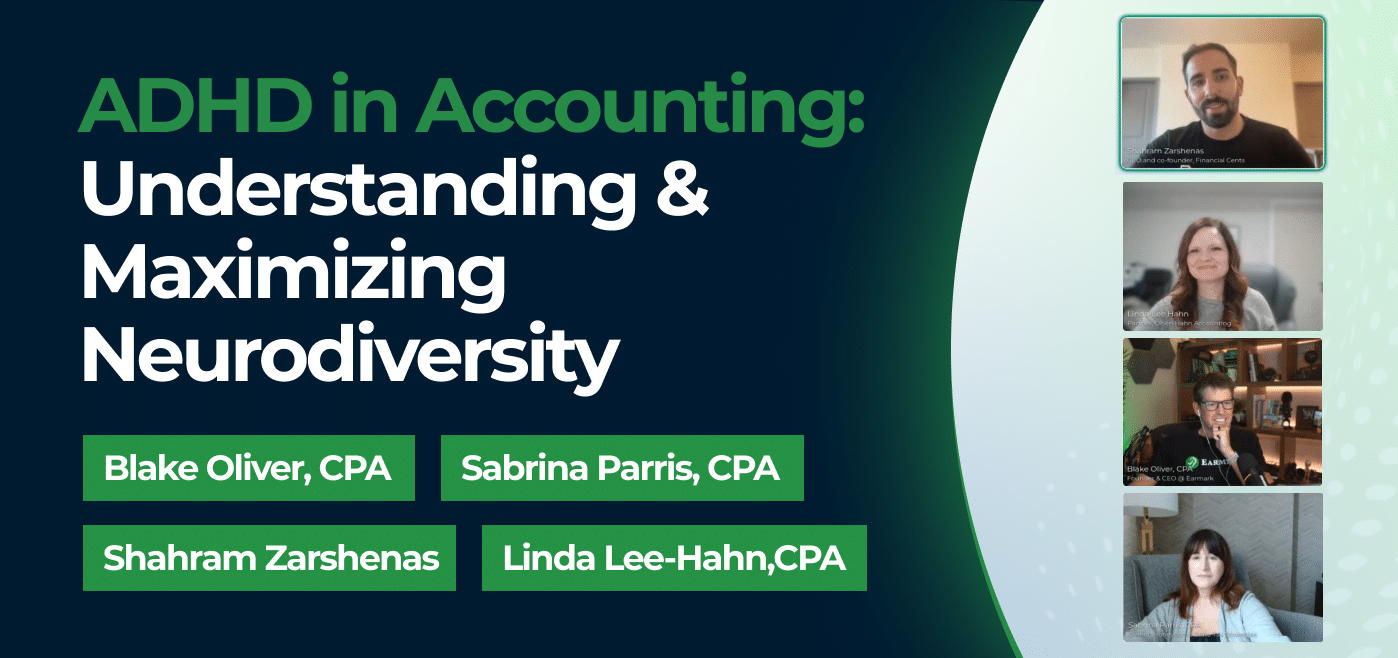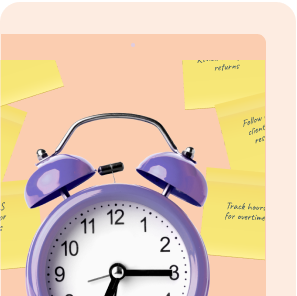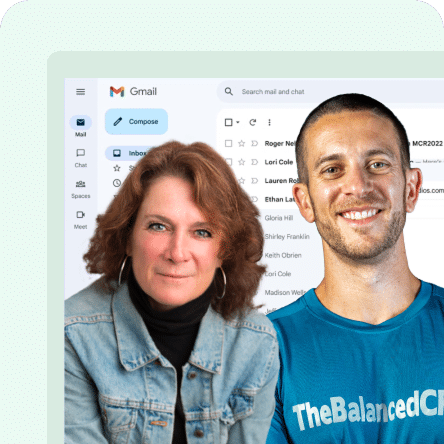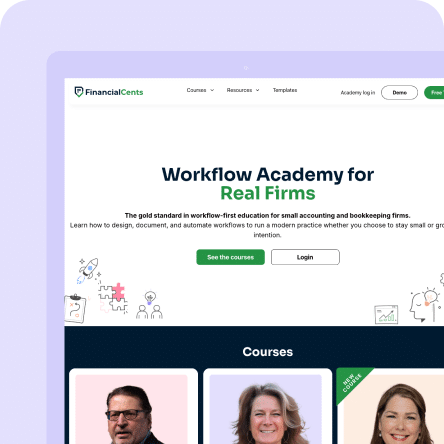ADHD is like having a superpower with kryptonite. It’s amazing when used correctly, but distractions can take you down."
Blake Oliver, CPAThe accounting industry is demanding.
It requires sustained focus, precision, and structure, which can be challenging for professionals with ADHD. But ADHD is not a weakness; it’s a unique advantage when properly understood and leveraged.
At WorkflowCon 2024, experts Blake Oliver, Sabrina Paris, and Linda Lee Hahn shared battle-tested strategies to overcome ADHD challenges and thrive in the accounting world. This article provides a step-by-step guide to understanding ADHD’s impact on accounting careers and how to optimize productivity and success.
Step 1: Recognizing ADHD Traits in Accounting
Understanding ADHD in the workplace is the first step in leveraging its strengths while mitigating challenges. Many ADHD professionals in accounting don’t even realize how their neurodiversity impacts their work until they hit career roadblocks like missed deadlines, overwhelming workloads, or frustration with routine tasks.
Common Strengths of ADHD Accountants
- Hyperfocus on complex problems – ADHD professionals can enter an intense state of deep concentration when working on challenging and engaging tasks, such as forensic accounting, tax strategy, or advisory roles.
- Rapid problem-solving and adaptability – The ability to quickly shift perspectives and generate creative solutions makes ADHD accountants excellent at troubleshooting financial discrepancies and identifying inefficiencies.
- High energy and enthusiasm for new projects – They often bring innovation to processes, making workflow automation and efficiency improvements a natural strength.
- Strong intuition for patterns and data analysis – Many ADHD professionals are excellent at recognizing trends in financial reports, even when they struggle with maintaining structured workflows.
- Resilience and crisis management – ADHD brains thrive under tight deadlines and fast-paced environments where quick thinking is required.
I never understood why I could hyperfocus on a tax problem for hours but struggled to answer simple emails. Turns out, it was my ADHD all along."
Sabrina Paris, CPACommon Challenges for ADHD Accountants
Despite these strengths, ADHD also brings obstacles that can be particularly difficult in traditional accounting environments.
- Repetitive tasks feel unbearable – Routine bookkeeping, reconciliations, and data entry can feel like “cognitive quicksand,” leading to avoidance and procrastination.
- Task switching is difficult. It can be overwhelming to move between multiple client projects, handle sudden interruptions, and switch from big-picture strategy to detailed execution.
- Time management struggles – ADHD accountants often underestimate the time required for tasks or get caught up in one activity, leading to missed deadlines.
- Difficulty prioritizing tasks – With multiple urgent tasks, ADHD professionals may struggle with deciding what to do first, sometimes focusing on low-priority tasks while ignoring high-impact deadlines.
- Inconsistent focus and motivation – Interest-driven motivation means ADHD accountants can produce incredible results when engaged but may struggle to maintain momentum for less stimulating work.
Accounting is built on structured work, which can feel impossible for an ADHD brain. But once I built systems around my strengths, I stopped feeling like I was struggling."
Sabrina Paris, CPAMastering Productivity with ADHD
For ADHD accountants, the key to productivity is creating external structure, breaking down tasks, and leveraging tools to stay engaged.
1. The Pomodoro Technique: Work in Sprints
- Best for: Avoiding burnout, staying engaged, and completing repetitive tasks.
- How it works: Work in 25- to 50-minute sprints, followed by 5- to 10-minute breaks.
- Why it works: Breaking tasks into short bursts prevents mental fatigue and maintains focus.
- Practical tip: Use a physical timer rather than a phone app to reduce digital distractions.
I use the Pomodoro method religiously. It’s the only way I passed the CPA exam."
Sabrina Paris, CPAExample for ADHD Accountants:
- 9:00 AM – 9:25 AM: Reconcile 2 client accounts
- 9:25 AM – 9:30 AM: Take a break (stretch, walk, drink water)
- 9:30 AM – 9:55 AM: Review outstanding invoices
- 9:55 AM – 10:00 AM: Take a short break
- Repeat
This method prevents ADHD accountants from feeling stuck in a long, monotonous work session.
2. Time Blocking: Structuring Your Day
- Best for: Prioritizing work and ensuring deadlines aren’t missed.
- How it works: Assign specific time slots for deep work, meetings, and administrative tasks.
- Why it works: Prevents decision fatigue and creates structured focus time.
- Practical tip: Color-code your calendar (green = focus work, red = meetings, yellow = admin tasks).
If it’s not on my calendar, it doesn’t exist."
Blake Oliver, CPAExample Time Block Schedule for an ADHD Accountant:
- 8:00 AM – 10:00 AM: Deep focus work (tax planning, financial analysis)
- 10:00 AM – 10:30 AM: Client communication and emails
- 10:30 AM – 12:00 PM: More deep work (audit reports, reconciliations)
- 12:00 PM – 1:00 PM: Lunch and movement break
- 1:00 PM – 2:00 PM: Admin work, client follow-ups
- 2:00 PM – 4:00 PM: Calls, meetings, and strategy discussions
- 4:00 PM – 5:00 PM: Wrap up outstanding work, plan for the next day
How to Implement Time Blocking:
- Review your daily tasks and categorize them into focus work, admin work, and communication tasks.
- Assign specific time slots for each type of task.
- Set reminders on your phone or computer to transition between tasks.
- Stick to the schedule, but be flexible when needed.
3. Task Prioritization: The “Big 3” System
- Best for: Reducing overwhelm and staying on top of deadlines.
- How it works: Each morning, identify three key tasks to complete that day.
- Why it works: Prevents decision paralysis and keeps work manageable.
I live by my to-do list. If it’s not on there, it doesn’t happen."
Linda Lee HahnExample:
- Big 3 tasks for the day:
- Complete tax return for Client X
- Follow up on unpaid invoices
- Review payroll reports for Client Y
Breaking work into three major priorities per day keeps ADHD professionals from feeling scattered or overwhelmed.
4. Accountability Systems: Using External Cues to Stay on Track
- Best for: Avoiding disorganization and keeping track of work.
- How it works: Use external reminders, apps, and structured systems to manage tasks.
- Why it works: Helps compensate for forgetfulness and executive function challenges.
“I rely on my calendar and AI note-taking apps to keep me accountable. If I don’t, I get lost in the chaos.” — Blake Oliver, CPA
Recommended Tools for ADHD Accountants:
- Google Calendar or Outlook: Set automated reminders for deadlines and meetings.
- AI Note-Takers (Fireflies, Fathom): Automatically transcribe meetings and track action items.
- Task Management Apps (Financial Cents, Trello, Asana, ClickUp): Organize projects visually and break them into steps.
- Financial Cents: Track client workflows, automate follow-ups, and set deadlines.
5. Using Movement to Maintain Focus
ADHD professionals often struggle with focus when sitting still for too long.
Incorporating movement recharges attention and prevents mental exhaustion.
Strategies for Incorporating Movement:
- Stand while working for 10-minute intervals.
- Walk around during phone calls.
- Take a short movement break every hour.
- Work in different locations (co-working spaces, different rooms).
I can’t sit in one spot for too long. A co-working space lets me move around and stay engaged."
Shahram ZarshenasControlling Distractions and Eliminating Procrastination
ADHD brains are highly sensitive to distractions and constantly seek novelty. With their long stretches of deep work and administrative demands, traditional office environments can lead to overstimulation, frustration, and burnout.
Why Distractions Are a Major Problem for ADHD Accountants
- Environmental distractions: Open offices, background conversations, and unexpected interruptions derail focus.
- Digital distractions: Emails, Slack notifications, and social media create dopamine hits that pull attention away from deep work.
- Task-switching overload: Constantly jumping between different accounting tasks leads to mental exhaustion.
- Boring tasks trigger avoidance: Repetitive bookkeeping or data entry often leads to procrastination in ADHD professionals.
The key to success is controlling distractions and using structured techniques to stay on task.
Building a Distraction-Free Work Environment
ADHD professionals need external structure to maintain focus. Here’s how to design a workspace that minimizes distractions.
1. Create a Focused Work Zone
- Use noise-canceling headphones. They block out office chatter and background noise.
- Minimize visual clutter. A clean, organized workspace reduces mental overload.
- Work in multiple locations. Moving between different settings helps reset focus.
- Use “Do Not Disturb” mode. Silence notifications and set focus hours.
I work best in a structured but flexible environment. Having noise-canceling headphones and a dedicated quiet zone saved my productivity."
Linda Lee Hahn2. Use Timers and Physical Cues
Accountants with ADHD need physical reminders to stay on track.
- Set a visible countdown timer. Pomodoro clocks, visual timers, or hourglasses help create urgency.
- Use sticky notes with task reminders. Write down the next step before leaving a task to prevent context-switching overload.
- Keep a whiteboard of key deadlines. Seeing deadlines visually keeps priorities top of mind.
I keep a giant whiteboard in my office. It’s the only way I remember everything."
Blake Oliver, CPAEliminating Digital Distractions
Digital distractions are one of the biggest productivity killers for ADHD accountants.
- Turn off non-essential notifications. Email, Slack, and phone alerts should be paused during deep work.
- Use website blockers. Tools like Freedom or Cold Turkey prevent social media scrolling.
- Batch email and message responses. Set designated times for communication instead of checking constantly.
- Automate responses. Use AI tools or email autoresponders to filter and organize messages.
I set Slack to only notify me for direct messages during the workday. Otherwise, I get lost in constant pings."
Shahram ZarshenasHow to Overcome Procrastination
1. The “Just Start” Rule
- Commit to working for just five minutes.
- Once started, momentum will often carry you through the task.
- Example: Open a tax return and review just one section
Getting started is the hardest part. I tell myself I’ll just work on something for five minutes, and that’s usually enough to get rolling."
Sabrina Paris, CPA2. Reward-Based Motivation
- Pair boring tasks with instant rewards (music, snacks, or movement breaks).
- Use the 10/5 Rule (10 minutes of work, 5-minute reward).
- Example: Finish one financial reconciliation, then take a coffee break.
I use rewards like checking my favorite news site only after finishing a tough section of work."
Blake Oliver, CPA3. Body Doubling for Accountability
- Work alongside someone else to stay on track.
- Use virtual co-working (e.g., Focusmate).
- Schedule check-ins with a colleague or mentor.
Having a co-worker sit with me while I do my most boring work keeps me accountable."
Linda Lee HahnSupporting ADHD Employees in Accounting Firms
Many accounting firms still operate under rigid, traditional structures that do not accommodate neurodivergent employees. ADHD accountants bring creativity, problem-solving, and high energy, but they need the right work environment to thrive.
How ADHD Employees Add Value to Accounting Firms
- They innovate processes. ADHD professionals excel at finding inefficiencies and creating automation solutions.
- They work well under pressure. Tight deadlines create an optimal dopamine surge, increasing performance.
- They thrive in advisory roles. Client-facing work is highly engaging for ADHD accountants.
- They bring fresh ideas. ADHD professionals are natural problem-solvers and out-of-the-box thinkers.
The ADHD accountants on my team are the most creative and driven employees we have. We just had to find ways to structure their work effectively."
Blake Oliver, CPAHow to Identify ADHD Employees Who Need Support
Many ADHD accountants go undiagnosed or struggle in silence. Here are signs that an employee may need a more ADHD-friendly workflow.
- Struggles to meet deadlines but produces excellent work under time pressure.
- Has difficulty with routine work but excels in high-stakes problem-solving.
- Generates great ideas but has trouble following through on execution.
- Has inconsistent productivity—some days hyper-focused, others overwhelmed.
I didn’t know I had ADHD until I realized I was thriving in crisis situations but failing at routine tasks."
Sabrina Paris, CPAHow Accounting Firms Can Support ADHD Employees
1. Offer Flexible Work Environments
- Allow remote or hybrid work options.
- Provide standing desks and movement-friendly spaces.
- Create quiet areas for deep work.
ADHD employees don’t thrive in cubicles. We need flexibility in how we work best."
Linda Lee Hahn2. Assign Work That Matches Their Strengths
- Place ADHD professionals in client-facing, strategy, or automation roles.
- Reduce repetitive administrative tasks by leveraging automation tools.
- Provide opportunities for high-engagement projects.
Once I transitioned from tax prep to advisory work, my career took off."
Sabrina Paris, CPA3. Use Structured Task Management Systems
- Implement accounting project management tools like Financial Cents.
- Create clear deadlines with built-in accountability.
- Use visual accounting workflow tools to help ADHD employees track progress.
Having a structured workflow system keeps ADHD employees from feeling lost in endless to-dos."
Blake Oliver, CPA4. Allow Role Customization
- Some ADHD professionals struggle with detailed compliance work but thrive in automation or innovation roles.
- Firms should create flexible career paths that allow ADHD employees to focus on their strengths.
I moved my ADHD employees out of data-heavy work and into process improvement roles. It was a game-changer for our firm."
Shahram Zarshenas5. Foster a Strength-Based Culture
- Focus on output, not hours worked.
- Encourage collaboration instead of micromanagement.
- Allow for different working styles while keeping clear expectations.
If you want to keep ADHD employees, stop measuring success by hours worked and start looking at output."
Blake Oliver, CPARethinking ADHD in Accounting
For too long, ADHD has been viewed as a challenge to overcome in the accounting industry. But in reality, it’s a unique cognitive strength that, when properly managed, can lead to extraordinary success. ADHD professionals bring innovation, problem-solving abilities, and a high-energy approach to their work, making them invaluable assets in a field that is rapidly evolving.
The key is not to force ADHD accountants into traditional, rigid workflows but to create an environment that allows them to thrive. Whether you are an ADHD professional looking to improve your productivity or a firm leader aiming to create a more inclusive work environment, the next step is simple: adapt, optimize, and embrace the future of accounting—one that works for every kind of mind.






